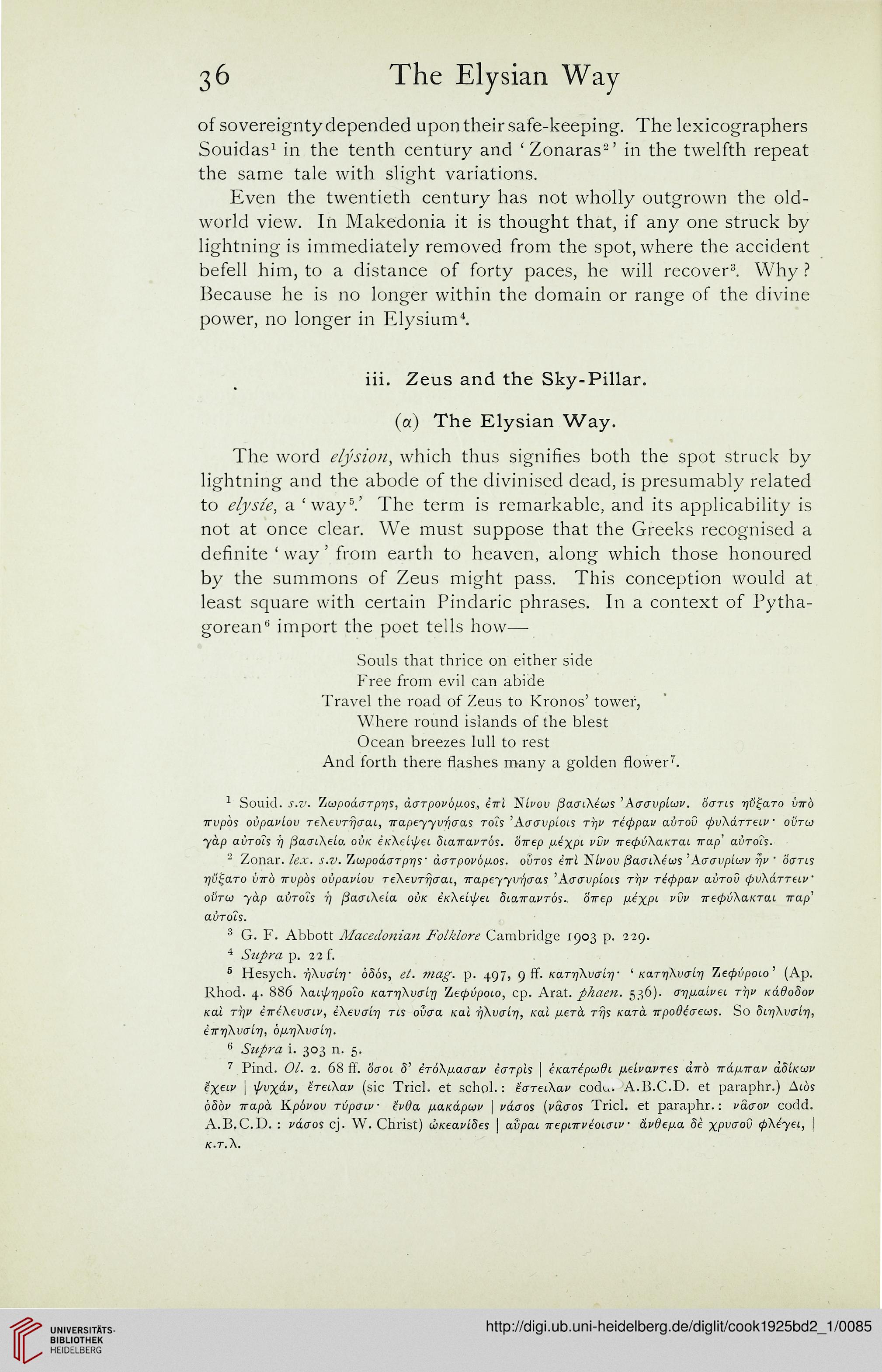36
The Elysian Way
of sovereignty depended upon their safe-keeping. The lexicographers
Souidas1 in the tenth century and 'Zonaras2' in the twelfth repeat
the same tale with slight variations.
Even the twentieth century has not wholly outgrown the old-
world view. In Makedonia it is thought that, if any one struck by
lightning is immediately removed from the spot, where the accident
befell him, to a distance of forty paces, he will recover3. Why ?
Because he is no longer within the domain or range of the divine
power, no longer in Elysium4.
iii. Zeus and the Sky-Pillar.
(a) The Elysian Way.
The word elysion, which thus signifies both the spot struck by
lightning and the abode of the divinised dead, is presumably related
to elysie, a 'way5.' The term is remarkable, and its applicability is
not at once clear. We must suppose that the Greeks recognised a
definite ' way' from earth to heaven, along which those honoured
by the summons of Zeus might pass. This conception would at
least square with certain Pindaric phrases. In a context of Pytha-
goreanB import the poet tells how—■
Souls that thrice on either side
Free from evil can abide
Travel the road of Zeus to Kronos' tower,
Where round islands of the blest
Ocean breezes lull to rest
And forth there flashes many a golden flower7.
1 Souid. s.v. TiwpodarprjS, aarpovbpos, eiri ~Nivov j3acri\eu}s 'AcrcrvpLtov. octtls rjv^aro virb
irvpos ovpav'iov re\evrrjo~ai, Trapeyyvrjcras rots 'Aacrvpiois rrjv recppav avrov cpvXdrreiv ovrco
yap avrois r) j3acri\eio. ovk eK\ei\pei diarravrbs. birep fiexpi vvv TrecpvXaKrai nap' avroTs.
2 Zonar. lex. s.v. Tiwpodcrrprjs' dcrrpovopios. ovros erri ~Nivov fiacrihews ' Acrcrvp'iwv r)v ' bans
rjv^aro vrrb Trvpos ovpav'iov reXevrrjaai, Trapeyyvrjcras 'Aaavpiois rr\v ricppav avrov (puXdrreiV
ovrio yap avrois r) fiaaiXe'ia ovk eK\ei\pei 5iaTravr6s.. orrep pexP1 v^v TrecpvXaKrai Trap'
avrois.
3 G. F. Abbott AIaceclo?iian Folklore Cambridge 1903 p. 229.
4 Supra p. 22 f.
8 Hesych. rjXvai-q- 656s, et. mag. p. 497, 9 ff. KarrfKvcr'nj- ' KarrjXvair] Ziecpvpoio' (Ap.
Rhod. 4. 886 Xai\prjpo?o KarrjXvairi Zecpvpoio, cp. Arat. phaen. 536). a-qp.alvei rrjv Kadobov
Kal tt)v eweXevaiv, iXevairj ris ovaa Kal rjXvairj, Kai p.erd rr)s Kara irpodeaeccs. So SirjXvairj,
eirrfKvo-iri, o/JLrjXvaLij.
6 Supra i. 303 n. 5.
7 Pind. 01. 2. 68 ff. baoi 5' irbXpiaaav earpis | eKaripccdi fieivavres drrb Trdpnrav db'iKicv
I ipvxdv, treiXav (sic Tricl. et schol.: iareiXav codu. A.B.C.D. et paraphr.) Atos
656;' irapa Kpbvov rvpaiv 'ivQa piaKapuv | vdaos (vdaos Tricl. et paraphr.: vaaov codd.
A.B.C.D. : vdaos cj. W. Christ) diKeavibes \ avpai Trepirrveoiaiv dvdepa 5e xpv<x°v <p~Xeyet, \
K.T.X.
The Elysian Way
of sovereignty depended upon their safe-keeping. The lexicographers
Souidas1 in the tenth century and 'Zonaras2' in the twelfth repeat
the same tale with slight variations.
Even the twentieth century has not wholly outgrown the old-
world view. In Makedonia it is thought that, if any one struck by
lightning is immediately removed from the spot, where the accident
befell him, to a distance of forty paces, he will recover3. Why ?
Because he is no longer within the domain or range of the divine
power, no longer in Elysium4.
iii. Zeus and the Sky-Pillar.
(a) The Elysian Way.
The word elysion, which thus signifies both the spot struck by
lightning and the abode of the divinised dead, is presumably related
to elysie, a 'way5.' The term is remarkable, and its applicability is
not at once clear. We must suppose that the Greeks recognised a
definite ' way' from earth to heaven, along which those honoured
by the summons of Zeus might pass. This conception would at
least square with certain Pindaric phrases. In a context of Pytha-
goreanB import the poet tells how—■
Souls that thrice on either side
Free from evil can abide
Travel the road of Zeus to Kronos' tower,
Where round islands of the blest
Ocean breezes lull to rest
And forth there flashes many a golden flower7.
1 Souid. s.v. TiwpodarprjS, aarpovbpos, eiri ~Nivov j3acri\eu}s 'AcrcrvpLtov. octtls rjv^aro virb
irvpos ovpav'iov re\evrrjo~ai, Trapeyyvrjcras rots 'Aacrvpiois rrjv recppav avrov cpvXdrreiv ovrco
yap avrois r) j3acri\eio. ovk eK\ei\pei diarravrbs. birep fiexpi vvv TrecpvXaKrai nap' avroTs.
2 Zonar. lex. s.v. Tiwpodcrrprjs' dcrrpovopios. ovros erri ~Nivov fiacrihews ' Acrcrvp'iwv r)v ' bans
rjv^aro vrrb Trvpos ovpav'iov reXevrrjaai, Trapeyyvrjcras 'Aaavpiois rr\v ricppav avrov (puXdrreiV
ovrio yap avrois r) fiaaiXe'ia ovk eK\ei\pei 5iaTravr6s.. orrep pexP1 v^v TrecpvXaKrai Trap'
avrois.
3 G. F. Abbott AIaceclo?iian Folklore Cambridge 1903 p. 229.
4 Supra p. 22 f.
8 Hesych. rjXvai-q- 656s, et. mag. p. 497, 9 ff. KarrfKvcr'nj- ' KarrjXvair] Ziecpvpoio' (Ap.
Rhod. 4. 886 Xai\prjpo?o KarrjXvairi Zecpvpoio, cp. Arat. phaen. 536). a-qp.alvei rrjv Kadobov
Kal tt)v eweXevaiv, iXevairj ris ovaa Kal rjXvairj, Kai p.erd rr)s Kara irpodeaeccs. So SirjXvairj,
eirrfKvo-iri, o/JLrjXvaLij.
6 Supra i. 303 n. 5.
7 Pind. 01. 2. 68 ff. baoi 5' irbXpiaaav earpis | eKaripccdi fieivavres drrb Trdpnrav db'iKicv
I ipvxdv, treiXav (sic Tricl. et schol.: iareiXav codu. A.B.C.D. et paraphr.) Atos
656;' irapa Kpbvov rvpaiv 'ivQa piaKapuv | vdaos (vdaos Tricl. et paraphr.: vaaov codd.
A.B.C.D. : vdaos cj. W. Christ) diKeavibes \ avpai Trepirrveoiaiv dvdepa 5e xpv<x°v <p~Xeyet, \
K.T.X.




